新目标英语九年级unit5单元课件
- 格式:ppt
- 大小:6.50 MB
- 文档页数:53
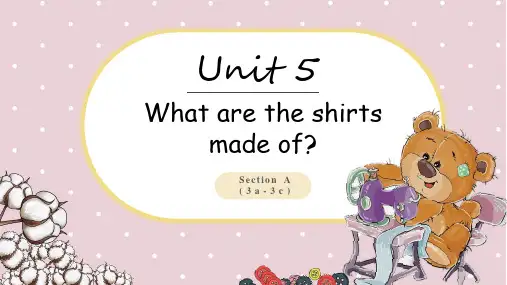
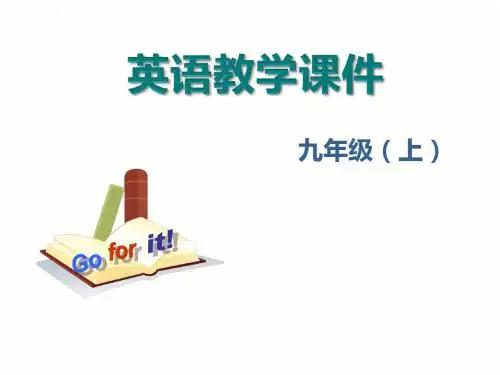
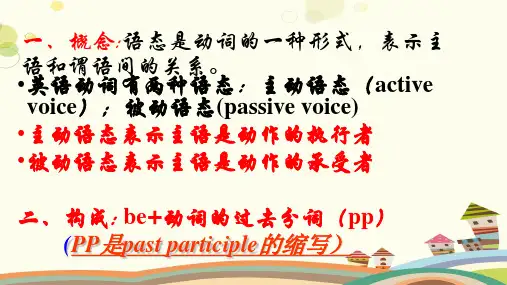
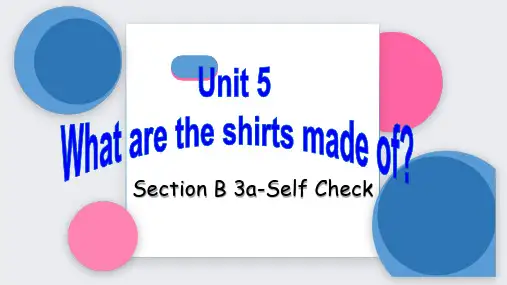
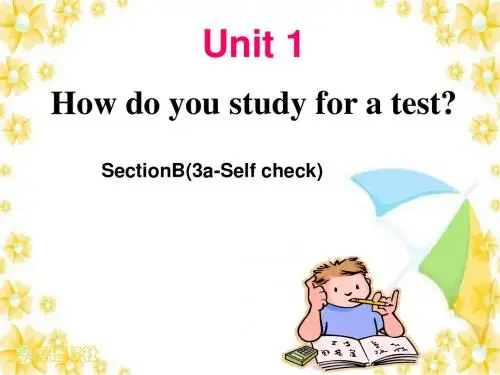
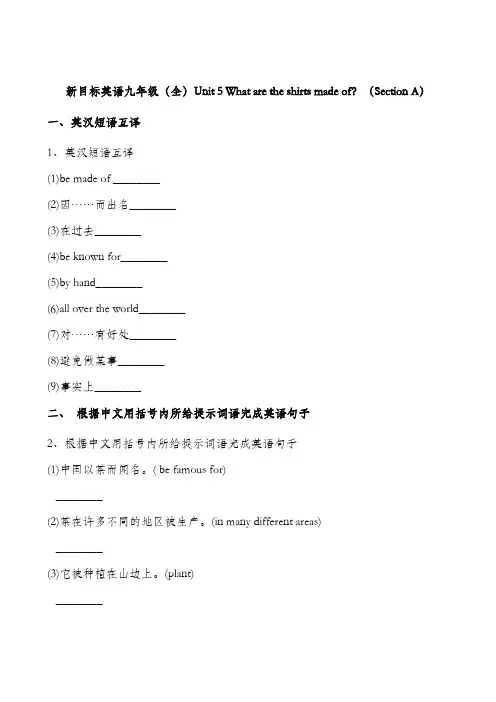
新目标英语九年级(全)Unit 5 What are the shirts made of?(Section A)一、英汉短语互译1、英汉短语互译(1)be made of ________(2)因……而出名________(3)在过去________(4)be known for________(5)by hand________(6)all over the world________(7)对……有好处________(8)避免做某事________(9)事实上________二、根据中文用括号内所给提示词语完成英语句子2、根据中文用括号内所给提示词语完成英语句子(1)中国以茶而闻名。
( be famous for)________(2)茶在许多不同的地区被生产。
(in many different areas)________(3)它被种植在山边上。
(plant)________(4)它们被手工采摘,然后送去处理。
(by hand,send for)________(5)有如此多的东西是在中国制造的。
(made in China)________三、按要求改写句子3、按要求改写句子(1)The students clean the windows once a week.(改为被动语态)The windows ________ ________ by the students once a week.(2)Some reporters are interviewing a government official on traffic problems now.(改为被动语态)A government official is ________ ________ by some reporters on traffic problems now.(3)Weifang is famous for kites. (改为同义句)Weifang ________ ________ ________ kites.(4)Does she wash her hands every day? (改为被动语态)________ her hands ________ by her every day?(5)My mother uses the computer every day. (改为被动语态)The computer ________ ________ by my mother every day.四、单选题4、This pair of shoes __________ hand, and it __________ very comfortableA、is made with; is feltB、are made from; is feltC、are made of; feelsD、is made by; feels5、Flowers __________ along the road last year.A、plantB、plantedC、are plantedD、were planted6、Do you know when the first train __________ in China?A、was producedB、is producedC、produced7、—Excuse me, sir. Smoking __________ in the gas station. —Oh, I'm really sorry.A、doesn't allowB、isn't allowedC、aren't allowed8、—Can you answer this question?—Sorry, I can __________ understand it.A、hardlyB、almostC、quiteD、nearly9、Sanya is famous __________ its beautiful beaches.A、ofB、forC、asD、with10、The paper is made __________ wood and the desk is also made __________ wood.A、of; fromB、of; ofC、from; ofD、from; from五、根据句意和汉语提示写出所缺的单词11、根据句意和汉语提示写出所缺的单词(1)Some foreigners don't know how to use ________(筷子).(2)The ________ (玻璃) breaks easily.(3)The ________ (当地的) people want to move to a big city.(4)The company has some different kinds of ________ (产品)(5)Email English is ________ (广泛地) used among young people.六、阅读理解12、阅读理解Every morning my father buys a newspaper on his way to work. Every evening my mother looks through magazines at home. And every night, I look at the posters with photos of David Beckham and Yao Ming on my bedroom wall before I go to sleep. Can we imagine life without paper or print?Paper was first created about 2,000 years ago, and has been made from silk, cotton, bamboo, and, since the 19th century, from wood. People learned to write words on paper to make a book. But in those days, books could only be produced one at a time by hand. As a result, they were expensive and rare. And because there weren't many hooks, few people learned to read.Then printing was invented in China. When printing was developed greatly at the beginning of the 11th century, books could be produced more quickly and cheaply. As a result, more people learned to read. After that, knowledge and ideas spread quickly. Today information can be received online, downloaded from the Internet rather than found in books, and information can be kept on CD-ROMs or machines such as MP3 players.Computers are already used in classrooms, and newspapers and magazines can already be read online. So will books be replaced by computers one day? No, I don't think the Yao Ming poster on my bedroom wall will ever be replaced by a computer two meters high!(1)What does the writer do before he goes to sleep?A、He reads books.B、He reads newspapersC、He looks through magazinesD、He looks at the posters on the wall.(2)When was paper first created?A、About 2,000 years ago.B、In the 19th century.C、About 1,000 years ago.D、In the 11th century.(3)Why were books expensive and rare before the invention of printing?A、People could not read.B、People could not write words on paper.C、People could not find silk, cotton or bamboo.D、People could only produce books one at a time by hand(4)What happened after books became cheaper?A、People didn't want to buy books.B、Printing was invented in China.C、Knowledge and ideas spread quickly.D、The Internet was introduced to people soon(5)What is the writer's opinion about books and computers?A、People won't need books any moreB、Books won't be replaced by computers.C、People prefer to find information in books.D、Computers have already replaced books.答案解析部分一、英汉短语互译1、【答案】(1)由……制成(2)be famous for(3)in the past(4)因…而闻名(5)用手(6)遍及全世界(7)be good for(8)avoid doing(9)in fact【解析】【分析】本题主要考查学生对基本短语的英汉互译的能力。
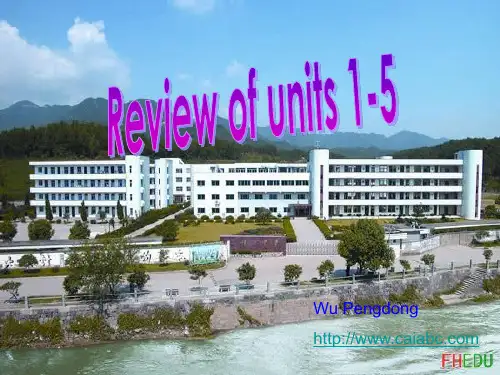
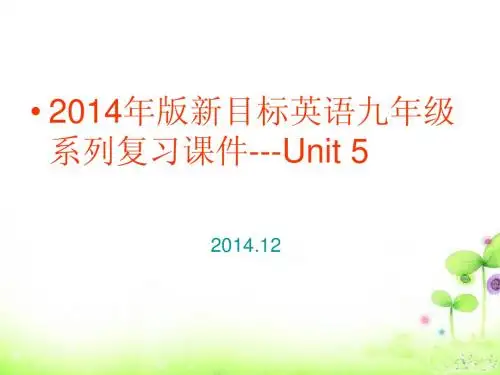
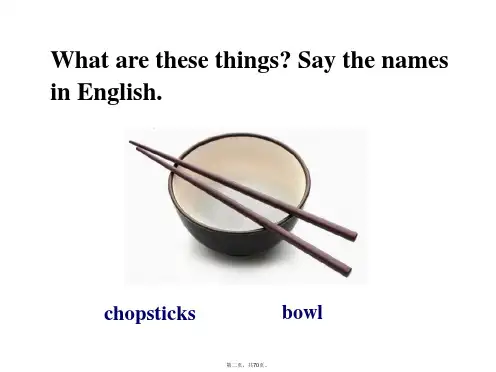

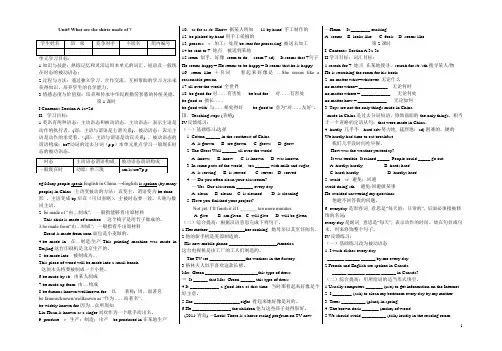
Unit5 What are the shirts made of ?单元学习目标:1.知识与技能:熟练记忆和灵活运用本单元的词汇,短语及一般现在时态的被动语态;2.过程与方法:通过独立学习、合作交流、互相帮助的学习方法来获得知识,培养学生的自学能力。
3.情感态度与价值观:培养和传承中华民族勤劳智慧的传统美德。
第1课时I.Contents: Section A 1a~2dII.学习目标:1.英语有两种语态:主动语态和被动语态。
主动语态:表示主语是动作的执行者。
(即:主语与谓语是主谓关系),被动语态:表示主语是动作的承受着。
((即:主语与谓语是动宾关系) 。
被动语态的谓语构成:be+动词的过去分词(p.p)本单元重点学习一般现在时态的被动语态。
eg:Many people speak English in China. →English is spoken (by many people) in China. 主动变被动的方法:宾变主,谓语变为be done 形,主语变成by后宾(可以省略),主被时态要一致,人称与数同主语。
2. be made of “由…制成”, 一般指能够看出原材料This chair is made of bamboo. 这个椅子是用竹子做成的。
3.be made from“由…制成”,一般指看不出原材料Bread is made from corn.面包是小麦做的。
4.be made in 在…制造/生产This printing machine was made in Beijing.这台印刷机是北京生产的。
5. be made into 被制成为…This piece of wood will be made into a small bench.这块木头将要被制成一个小凳。
6.be made by sb. 由某人制成7.be made up from 由….构成8.be famous/known/wellknown for 以... 著称; 因…而著名be famous/known/wellknown as “作为……而著名”,be widely known for因为…众所周知Liu Huan is known as a singer.刘欢作为一个歌手而出名。
新目标九年级Unit 5 What are the shirts made of? 讲义一、词性转换Section A1. environmental → (n.) environment2. produce → (n.) production3. widely → (adj.)wide4. France → (adj.) French5. Germany → (adj.) German Section B6. competitor → (v.) compete7. celebration→ (v.) celebrate8. historical→ (n.) history二、短语归纳1. be made of 由…制成(看得见原材料)2. be made in 在…制造3. be made from由…制成(看不见原材料)4. environment protection环境保护5. be famous for 以…著名6. be famous as作为…而著名7. be known for以…闻名8. as far as I know 据我所知9. on the sides of mountains在山腰上10. by hand用手11. all over the world全世界12. be good for对…有益13. be good at擅长14. in the future将来15. traffic accident交通事故16. turn…into…把…变成…17. according to根据;按照18. send out放出19. ask for help请求帮助20. in trouble处于困境中21. be covered with用…覆盖22. rise into the air升到空中23. paper cutting剪纸24. be used by被…使用25. be used for 被用于(做)…26. good luck好运27. sky lanterns孔明灯28. at a very high heat在高温下29. go on vacation去度假30. see…as…把…视为…;看作为三、句型集萃1. “be + 及物动词的过去分词”构成被动语态2. It seems that + 从句好像…3. no matter + 从句无论…4. find it + 形容词+ that 从句发现…(是怎样的)5. buy sb. sth. = buy sth. for sb. 给某人买某物6. avoid doing sth. 避免做某事7. allow sb. to do sth. 允许某人做某事8. want to do sth. 想做某事9. learn to do sth. 学会做某事10. try to do sth. 尽力做某事11. It takes + 一段时间+ to do sth.做某事花费多长时间12. used to do sth. 过去常常做某事四、重点句子1. When the leaves are ready, they are picked by hand and then are sent for processing. 当树叶长好时,人们用手采摘它们,然后(它们)被送去加工。
Unit 1 How do you study for a testSection A1. How do you study for a test? 你怎样为考试做准备?2. by 1)通过…..方式(途径)。
(by doing sth 通过做某事)例:I learn English by listening to tapes. 2)在…..旁边。
例:by the window/the door 3)乘坐交通工具例:by bus/car4)在……之前,到……为止。
例:by October在10月前5)被例:English is spoken by many people.6) 由于by mistake 7) 连接one by one 一个接着一个3. ask:1) ask sb (not)to do sth .请某人(不要)做某事2) ask sb about sth .询问某人关于某事He asked me about the meeting.3) ask for…. 请求/要……如:I’ll ask for two days off. 我将请两天假。
4) ask sb for sth 向某人请求/要某物ask the teacher for help 向老师求助4. practice doing 练习做某事She often practice speaking English. 她经常练习说英语。
5. What/ how about +doing sth.? 做某事如何?6. aloud / loudly / loud1)aloud: adv,强调发出的声音能被听见,意为“出声地”或“大声地”,常与read,call连用,无比较级和最高级。
He read the story aloud to his son.他朗读那篇故事给他儿子听。
2)loud: adj/adv “响亮的/地;大声的/地;高声地”,侧重发出的声音大,传得远。